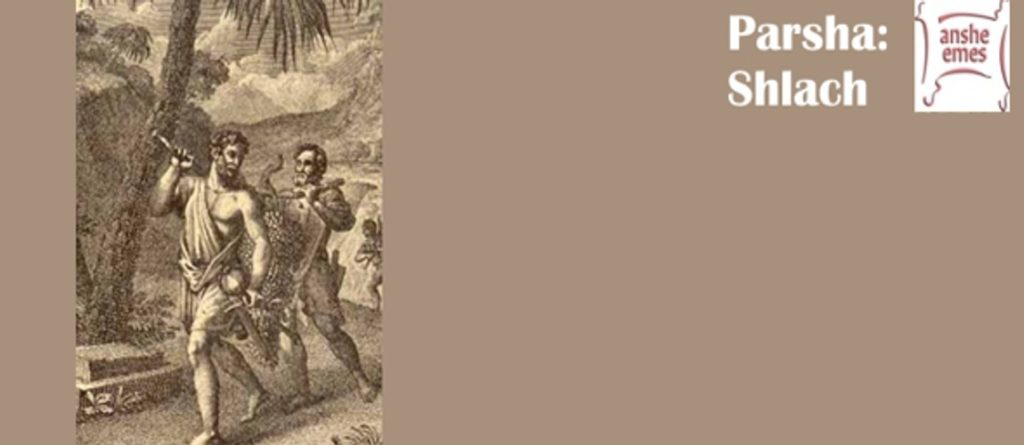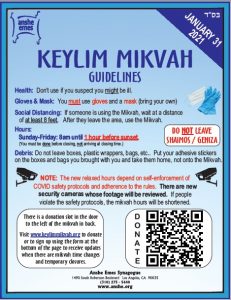
SHLACH
I. Summary
A. The Spies. After reaching Kadesh (in the wilderness of Paran), twelve leaders (one from each tribe) were sent by Moshe to explore Canaan (Israel) and report back on its land, inhabitants and dwellings. The spies returned forty days later with huge clusters of grapes, pomegranates and figs evidencing the land’s fertility; however, except for Calev and Yehoshua, they returned with the pessimistic report that the Israelites would be unable to conquer Canaan since its cities were too strongly fortified and its inhabitants too powerful. Calev and Yehoshua disassociated themselves from this report and instead urged the people to march onward towards Canaan. The people, however, listened to the majority’s report and openly rebelled, calling for a new leader to lead them back to Egypt. They refused to heed Calev’s and Yehoshua’s renewed pleas and threatened to stone them.
B. Moshe Again Intercedes; The People’s Punishment. Angered by the people’s lack of faith, Hashem expressed His intention to destroy them and form a nation exclusively from Moshe’s descendants. Moshe again successfully interceded on the people’s behalf; however, while they were saved from total destruction: (a) they were condemned to wander in the desert for 40 years (1 year for each day the spies were gone), until everyone over the age of 20 (except for Calev and Yehoshua) died, whereupon a new generation would then be permitted to enter Canaan; and (b) the 10 spies who gave the pessimistic report died of a sudden plague. The Israelites, belatedly realizing their error (and ignoring Moshe’s warning that it was futile since Hashem wasn’t with them), attempted to go to Canaan, but were soundly defeated by the tribes of Amalek and Canaan.
C. The Offerings. Hashem assured the people that their descendants would possess Israel, and told Moshe to prescribe the following laws (which would become effective at that time): that animal offerings be accompanied by meal-offerings and drink-offerings; that part of the dough called “Challah” be set aside for Hashem (it was given to the Koheinim); and that if they erroneously practiced idolatry, they should atone with sacrifices.
D. Shabbos/Tzitzis. While in the wilderness, a man found violating the Shabbos was ordered by Hashem to be stoned by the congregation. The law of Tzitzis to be worn on the four corners of one’s garments was given to the people to remind them of the need to observe Hashem’s commandments at all times.
II. Divrei Torah
A. Lil’Mode U’lilamed (Rabbi Mordechai Katz)
1. The Sin of The Spies: A Lack of “Bitochon” (Faith in Hashem). Not only were the spies killed by a plague and the people condemned to wander for 40 years, but the date of this event (Tisha B’Av) was to become a day of continued tragedy for the Jews (e.g., both Temples were destroyed; the Jews were expelled from Spain, etc.). What was so great about the spies’ “crime”? Until this event, the people had adopted the attitude of “Na’aseh V’Nishmah” (“We will do, and [then] we will listen”) — that is, they were willing to accept Hashem’s leadership without question. At the time of the spies, however, they no longer accepted Hashem’s guarantees of protection, instead doubting His strength and promise to them. It was this lack of faith which led to their suffering and the later tragedies.
2. Achdus (Brotherhood). Twelve men were chosen to spy on Canaan and their efforts led to tragedy; however, when Yehoshua later sent out 2 men to spy on Yericho, the outcome was much more successful. What’s the difference? Twelve spies were necessary in the former situation because some of the tribes distrusted the others and insisted on having their own leader represent them. This revealed a lack of Achdus, unity among the Jews, and eventually led to tragedy. It’s interesting to note that the only difference between the word “gola” (the root of “golus” (“exile”)) and “geulah” (the redemption of the Messianic age) is an extra Aleph, which a great Sage commented represents Achdus.
B. Majesty of Man (Rabbi A. Henach Leibowitz)
Bitochon. After the spies returned with their negative report, the nation “cried that night”. The Midrash tells us that Hashem viewed their crying “for naught” and declared that He would “cause them to cry [on this night] for generations”. But, was their reaction so unreasonable after hearing the report of their seemingly inevitable doom at the hands of giants? The Jews had, however, witnessed the Ten Plagues, the splitting of the Red Sea and the Egyptians’ defeat, the miracle of Manna, etc. Had they taken these experiences to heart, they would have had true Bitochon and realized themselves that their tears were for naught. When we’re in difficult situations, we must remind ourselves of Hashem’s all-encompassing love for us; the light of our Bitochon will make our trials and difficulties less daunting.
C. Reb Chaim’s Discourses/Inspirations and Insights
The Lesson of Miriam. Why is the story of Miriam’s punishment for speaking “loshon hara” (gossip/slander) against Moshe juxtaposed with the story of the spies? Rashi notes that this shows us that, although the Israelites observed Miriam being punished for slandering Moshe, they failed to learn from her lesson. Had they done so, they might have had the fortitude to avoid speaking loshon hara about the promised land of Israel.
D. Love Thy Neighbor (Rabbi Zelig Pliskin)
1. We must learn to see the good in everything and everybody. As noted above, Rashi states that the juxtaposition of the stories of the spies and Miriam teaches us that the Jews didn’t learn the lesson from Miriam’s experience. But, Miriam spoke against a person; the spies were merely spoke against the land? Rabbi Yisroel Ordman explains that one must acquire the attribute of always seeing the good in everything. One who finds fault in things (e.g., meals, accommodations, etc.) will also find fault in other people; conversely, one who sees the good in things will see the good in his fellow man. Thus, the lesson the spies should have learned was to notice virtues rather than faults. As a pious man once noted: “We are given two eyes; one is very powerful for introspection, so that we can find even or smallest faults; the other is very weak, for viewing others. Unfortunately, we often switch their functions.”
2. The gravity of Loshon Hora. The Talmud teaches that we learn the severity of loshon hora from the story of the spies — if they were punished so severely for speaking loshon hara against the land, how much more serious is it if we speak loshon hara about another person?!
E. Drash Moshe (Rav Moshe Feinstein, z’tl)
The Effect of Loshon Hora. We learn that the spies and the people were punished for loshon hara; but, wasn’t the Jew’s lack of Bitochon a much greater transgression? We learn from this that the sin of corrupt character traits manifested by speaking evil without any gain leads to the more grave sin of denying Hashem’s power.
F. Growth Through Torah (Rabbi Zelig Pliskin)
1. Beware of false conclusions from the facts that you observe. The Akaidah explains that the spies’ report about the inhabitants and land was appropriate; what was inappropriate, however, was their conclusion that the Jews couldn’t conquer Canaan, for clearly Hashem has the power to help against all odds. Just because they didn’t think it was possible to conquer Canaan didn’t mean it wasn’t possible. Very often we see factors in a situation and come to erroneous conclusions based upon our perception. Even if our observations are accurate, there can always be factors which we didn’t take into account and/or of which we are unaware. This is especially true when making judgments about other people.
2. Realize your own value as a person. “And we were in our sight as grasshoppers, and so we were in their sight.” The Kotzker Rebbe said that the spies’ mistake was in the words “and so we were in their sight”; that is, it shouldn’t bother a person how others view him. One can never rest if his/her self-esteem is dependent on others’ approval. Keep your focus on doing what is right and proper and work on mastering your self-image (being ever cognizant of the fact your intrinsic value as being created in Hashem’s image) regardless of how others view you. The Chofetz Chaim said, “when you view yourself as inferior, you will assume that others also view you as inferior; but the truth could well be that the other person views you in a much higher manner”.
3. Humility Allows One To Be Satisfied. “The land (of Israel) is very, very good.” R’ Moshe of Lelov taught, when does one find the land is good? When he/she is humble. An arrogant person demands that everything should be exactly as he wishes. He lacks patience, which causes him much frustration and suffering. But a humble person finds it easy to accept things not being the way he wised. He focuses on the positive in each situation.
G. Kol Dodi on the Torah (Rabbi David Feinstein)
The Connection Between Tzitzis and the Exodus. The Torah connects the mitzvah of Tzitzis to the Exodus; a few verses earlier, it states that looking at the Tzitzis will protect us from straying after our hearts and eyes. This is a warning not to be like the spies, who were led astray by the desires of their hearts. Instead, says Hashem, we should learn from Hashem’s behavior in taking us out of Egypt — if Hashem hadn’t remembered His promise to our Patriarchs, our unworthiness at that time would have given Him many excuses to follow the ways of His heart, as it were, and leave us in Egypt. It was only by suppressing the natural inclinations of His heart that He was able to free us and give us His Torah.
H. Genesis Project
A lesson is self-perception. “The sky is falling!” they shouted. Well not quite, but when the ten spies who went to examine the Land of Israel brought back tales of horrific stories of mighty and formidable enemies they threw a confident nation into sheer terror. It is almost inconceivable that a nation that saw a sea split and Egypt humbled would shirk in utter terror — because of reports of giants and fortified cities in their new country. The Midrash details the episode. Upon returning to the Jewish camp the ten spies dispersed amongst their own families and began to bemoan their fate. “Woe is to us!” they cried. “Our daughters will be taken captive, our sons murdered, and our possessions looted!” Neighbor to neighbor, the tales spread, and within hours, the entire nation was in a rebellious uproar, ignoring the positive reports that Calev and Yehoshua brought back. They even besieged Moshe, demanding to return to Egypt. he Torah details the Jews’ mordant reaction to the malicious tales of gloom. Yet, it seems that it was not the tales of fortified cities or the sight of mutated-looking giant fruits or even the actual giants themselves that caused the Jews to lament. The way the story is related, the actual wailing and rebellion occurred only after an interesting detail. The spies described the giant men whom they encountered and the way they felt during that experience. “And there we saw the sons of giants; we felt in our own eyes like grasshoppers next to them” (Numbers 13:33). Immediately, the next verse tells us, “The entire assembly raised up their voices and wept that night, saying if only we had died in the land of Egypt or in the wilderness!” (Numbers 14:1-3) It seems that the final words of the spies, “we felt in our own eyes like grasshoppers next to them,” set up this tragic and futile reaction. Why? Rabbi Zvi Kamenetzky, relates the following story: Yankel, one of Warsaw’s poorer folk, received a first-class train ticket from a wealthy cousin to visit him in Lodz. Yankel arrived at the station clutching his ticket tightly. He never took a train before and had no idea where to go. He spotted some well-dressed individuals and just knew he was not sitting with them. Then in the far corner of the waiting room he noticed a group of vagrants with packs on their shoulders, their eyes shifting back and forth. Yankel meandered toward them, figuring that their place was his. The first class passengers began to board but the vagrants still waited. All of a sudden, the whistle blew and the train began to move. The vagabonds quickly jumped aboard the baggage car, Yankel following in pursuit. He slithered into the dark car and lay with them underneath a pile of suitcases, still clutching his ticket in fear. He endured the bumps and heat of the baggage car and figured that such was his fate until the door of the baggage compartment flew open and a burly conductor flanked by two policemen entered. They began moving suitcases and bags until they spotted poor Yankel and some of his new-found friends cowering in a corner. The large conductor loomed over them and asked with a sneer in his voice, “can I see your tickets?” Yankel looked up from his coat to see the officers staring at him. He emerged from the group, shaking, and presented the sweat-infused ticket that he had been clutching ever so tightly during the entire ordeal. The conductor looked at it carefully and then began to laugh hysterically. “Young man,” he barked, “you have a first-class ticket! What are you doing here lying with these dregs in the baggage compartment? When you have a first-class ticket you ought act like a first-class passenger!” The Jewish nation had no fear of giant fruit or giant men. They knew they had leaders that could overcome any obstacle. After all, Moshe led them across the Red Sea. Yehoshua and Chur helped defeat Amalek. But when they heard the ten spies – princes of the tribes — claim that they felt like insects they knew that they had no chance to conquer the land of Israel. They had nothing left to do but cry. Because if you are holding the first class ticket but act as if you are a itinerant then your ticket is worthless. The giant fruit, fortified cities and powerful giants – all tiny acorns compared to the power of the Almighty – suddenly loomed large. And the sky began to fall on a self-pitying nation that was led by self-pitying leaders. And with the falling sky, fell the dreams, hopes, and aspirations of a generation that once yearned to dwell in the land of their forefathers. The Jewish nation was left to ponder that message for 40 years in the desert and perhaps thousands of years in the Diaspora. That is what happens when mighty princes with first-class tickets to paradise think that they are tiny grasshoppers holding tickets to nowhere.
I. Studies in the Weekly Parsah (Artscroll)
The meaning of Tzitzis. Rashi, quoting the Midrash, explains that the Tzitzis remind of the 613 mitzvos (i.e., the numerical value of the Hebrew word is 600 + 8 strings + 5 knots = 613). Ramban, however, notes that the word Tzitzis appears in the Torah without the second “yud”; also, per Hillel, one needs only 6, not 8, strings, and legally one is only required to have 2 knots; thus, its numerical value isn’t necessary 613. Rather, he associates the mitzvah with “techeiles” (the turquoise thread) which is to remind us of Hashem (i.e., its color is to remind us the sea and, in turn, the sky and, in turn, Hashem’s Throne of Glory).
J. Artscroll Chumash
Free Will. The implication of this Parsha is that Hashem gave Moshe permission to send spies, but left the decision up to him. Moshe, in turn, approved the people’s demand in hopes of dissuading them (the Sages offer the parable of a buyer who becomes convinced of a donkey’s worth simply because its seller was so willing to let him “test drive” it); the fact that Moshe suspected that the mission would end disastrously is also evidenced by the fact that he changed “Hoshea’s” name to “Yehoshua” (adding a “yud” to signify Moshe’s prayer that Hashem should help save Yehoshua from the conspiracy of the spies (Rashi)). Nonetheless, Moshe permitted them to go, because the people want them to and Hashem doesn’t deny people freedom of choice.
K. Parsha Parables (Rabbi Mordechai Kamenetsky)
Looking to the past. The Torah alludes to a fascinating episode that occurred at the onset of the mission. “And they (the 12 spies) went up to the south, and he went on to Hebron; there lived . . . the children of the giants.” The Talmud explains that the change from plural to singular means that although all the spies went up together toward Hebron, Calev drifted away alone to visit the Tomb where the Patriarchs and Matriarchs were buried. What motivated Calev to leave the group and go “touring”? The spies were about to encounter giants. Rather than facing such terrors alone, Calev searched for inspiration from our forefathers and foremothers who gave of their lives and endured plagues and famine in order to inherit the land of Canaan. In times of crisis, we too are well advised to seek inspiration from our forebearers. Although they may not be here with us, their actions and advice serve as an inspiration and guiding force for all future generations.
L. Living Each Week (Rabbi Abraham Twerski)
1. Admitting a wrong. The Israelites’ attempt to enter Canaan after G-d had decreed their punishment ended in a disastrous defeat. Inasmuch as they appeared to have admitted they were wrong, saying “we have sinned, and were ready to enter the land, why were they not forgiven? Was this not adequate teshuvah (repentance)? The Bal Shem Tov, z’tl, answers this by punctuating the above verse to mean: “we are ready to go up to the place, for G-d has said that we sinned.” In other words, despite the severe Divine reprimand, they remained self-righteous and didn’t concede that they had done wrong. All they were willing to accept was that G-d said they had done wrong. Their statement was one of defiance rather than of contrition. Doing wrong is bad enough, but refusing to acknowledge that one was wrong is far worse. In dealing with ourselves and others, we must not be blinded by self-righteousness; rather, we must have the strength and courage to admit when we were wrong.
2. Not “If” But “How”. Why was the mission of the spies in this week’s Parsha so disastrous, whereas the mission of the spies sent by Joshua was so successful? The former went to see whether the land was conquerable. Although G-d had assured them that they would receive the land, they did not have trust in Him, and they deliberated whether or not the Divine word was reliable. The latter, on the other hand, had no doubt about their ultimate triumph. Their mission was merely to determine the best method for entering the land (i.e., how to implement G-d’s will). If one questions whether or not to obey the Divine will, there will be no scarcity of reasons why not to do so. If, however, one is determined to follow G-d’s instructions and seeks only how one can best do so, one’s efforts will be blessed with success.
M. Vedibarta Bam (R’ Moshe Bogomilsky)
1. Sphere of Influence. “And how is the land . . . are there trees or not?” Rashi comments that Moshe instructed the spies to see if there were any righteous people there whose merit would protect the dwellers of the land. Why, then, didn’t he instruct the spies to search the synagogues, rather than the fields? Moshe was incidentally conveying the message to the Jewish people that a truly righteous person doesn’t go into seclusion and lock himself into a synagogue or house of study. A truly righteous person is compared to a tree; he is out among the people producing fruit (good deeds).
2. Importance of Israel. “You should not fear the people of the land, for they are our bread; their protection has departed from them.” What is the significance of the comparison to bread? Bread is a staple which sustains life. If, G-d forbid, one lacks bread, he will do everything possible to obtain it. With the words “they are our bread,” Yehoshua and Caleb were declaring that the land of Israel was (and is) as important as bread. Thus, they had to ready for anything – even the most profound self-sacrifice – in order to acquire it.
N. Torah Gems (Aharon Yaakov Greenberg)
1. Seeing With Our Own Eyes. “Send you men . . . ” Why does the Torah follow the story of Miriam speaking against Moshe with that of the spies? Because, Rashi teaches, she was afflicted for maligning her brother and they (the spies) did not learn from it. A profound idea is hinted at here: if a person does not wish to see the truth, nothing will help, even if one shows it to him clearly. Such a person simply has closed his eyes and cannot see. That is the stress here: these wicked men saw; with their own eyes and did not merely hear of it; yet, they failed to learn from it. R’ Yisroel Morgenstern of Pilov.
2. Believing Is Seeing. R’ Nachman of Breslov quoted the verse “the heavens were opened and I saw visions of G-d.” The anagram of the first letters of the five Hebrew words spelling this phrase form the word emunah (faith). When a person has faith, he sees.
3. Miracles. “And they returned from searching the land after forty days.” Because G-d planned to decree a year for each day, he sped up the trip (Rashi). The fact that G-d caused a miracle should have proved conclusively that He would be able to make them inherit the land. Miracles, though, are meant for those who believe. Those who do not believe will not see them. R’ Shlomo of Karlin.
4. True Repentance. “Lo, we will go upon the place which the L-rd has said we have sinned.” R’ Avraham Mordechai Alter of Gur once visited R’ David Goldman in Kielce and asked him: “As Chazal teach us that the gates of repentance are never locked, why was the Jews’ repentance not accepted?” R’ David answered: “It is true that repentance is accepted, but that is only if the person realizes that he has sinned, regrets his action and forsakes that action in the future.” Here, the Jews failed to take such steps, noting only that “G-d has said” that we have sinned. Personal responsibility if a prerequisite to repentance.
5. Early Chinuch. “Of the first of your dough you will give unto the L-rd.” From the first – from the very beginning, when the child is still an infant, one must teach him/her the Torah and fear of G-d. While a child in still in the crib (a word play, since the word for “dough” and “crib” are both arisah in Hebrew) one must implant in him/her a love and G-d and dedication to all that is holy. Tal Orot.
6. Complete Service Of G-d. “I am the L-rd your G-d who brought you out of the land of Egypt, to be your G-d. . . . ” To be your G-d – even the “your” component of your lives (your material wants and desires) should be sanctified to serve G-d. R’ Yisrael of Rozhin.
O. Table Talk (R’ Raphael Pelcovitz)
Logic Is Not Always Reasonable. The Alshich speculates that Moshe, worried about the spies’ mission, sought to lessen the risk by removing the representatives of two tribes who, he felt, had fatal character traits. Ironically, it was the representatives of these two tribes – Calev and Yehoshua – who brought back the positive report. Divine Providence, not our mortal logic, dictated (and dictates) the correct path.
P. Rabbi Frand on the Parsha (R’ Yissochar Frand)
Seeing Beyond The Surface. When Moshe sent off the spies, he told them “and you shall see (ure’isem) the land.” When he gave the mitzvah of tzitzis, he said “and you shall see (ure’isem) it and recall all G-d’s commandments.” What is the significance of this similarity? The Talmud (Menachos 43b) how “seeing” the tzitzis leads us to recall the commandments. The key is the blue techeiles thread, which is reminiscent of the sea. The blue sea recalls the blue sky. The sky recalls the Throne of Glory, and the thought of the Throne of Glory reminds us to perform the mitzvos. Unlike the spies who could not see beyond the surface of the land, the tzitzis remind us that we can (and must) see far beyond the surface.



 Visit the group and request to join.
Visit the group and request to join.

This appeared- on your website for Parshat Shalach- Any idea of the source?
Thank you
Shana tova tikatevu
We are given two eyes; one is very powerful for introspection, so that we can find even or smallest faults; the other is very weak, for viewing others. Unfortunately, we often switch their functions.”